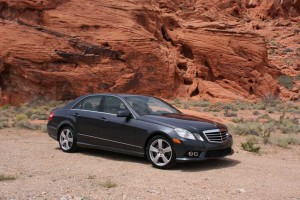
On the rocks? Despite the launch of a new Mercedes-Benz E-Class, Daimler AG racked up significant losses in 2009.
Daimler AG suffered $500 million loss in the fourth quarter as a drop in sales, special charges and tougher financing conditions hampered the company’s efforts at a turnaround. For the year, Daimler’s losses topped $3.6 billion.
The bad news follows word that the company’s board has approved a three-year extension of the contract for Daimler’s characteristically optimistic CEO, Dieter Zetsche. (Click Here for more.) The new agreement extends through December 31, 2013. But there’s little doubt Zetsche will face enormous pressure to reverse the German company’s slide.
“The main reason for the Group’s unsatisfactory profitability in 2009 is that vehicle unit sales fell in all segments due to the global economic crisis,” the company said in a financial report released Thursday. “However, the decline in earnings was significantly alleviated by measures taken by the Group at an early stage to adjust costs, as well as by further efficiency enhancements in the context of the optimization programs already running.”
Overall, revenues dropped by 20 percent last year, Daimler reported. The company also announced it planned to eliminate its dividend for the second year in a row, a move that is bound to anger the company’s smaller shareholders.
“Due to the net loss, the Board of Management recommends to the Supervisory Board that no dividend should be distributed for the year 2009. This decision is solely a reflection of the course of business in 2009 and is not related to the group’s expected business development this year,” the company said.
Daimler is betting that it can – and must – continue to lead the industry in terms of product development, as well as the development of the technological innovations that increasingly differentiate brands. To back that position up, the Group maintained a high level of research and development spending, a total of $5.6 billion last year.
The main areas of focus were new, fuel-efficient and environmentally-friendly drive technologies, in line with the company’s “Road to Emission-free Mobility” initiative. Daimler is pressing heavily into electrification, last year launching its first hybrid models, as well as moving forward with pure battery power. But safety is another area of heavy R&D spending.
In the years 2010 and 2011, Daimler said it plans to spend a total of $13 billion on its research and development activities, roughly 70% of that total earmarked for the Mercedes-Benz Cars division.
“Last year brought many great challenges also for Daimler,” said Zetsche. “But as the year progressed, we made the Group significantly more efficient and laid the foundations not only to overcome the upheaval affecting our industry, but to lead from a strong position. We are emerging from the crisis with plenty of torque,” he said.
Zetsche noted that the world economy is still in a period of transition, cautioning that while the worst may be over, “there is very little hard evidence that a self-sustaining, lasting upswing has actually started.” But he said that challenges in developed markets are being offset by the “positive influence” of China and India.
According to general industry estimates, worldwide demand for automobiles will grow this year between 3 percent and 4 percent compared with the crisis year 2009. Growth in the premium automobile segments was stunted, last year, because luxury products were generally excluded from government-funded incentive programs, such as Cash for Clunkers. But fewer such campaigns are anticipated in 2010, which means luxury cars could regain share.
Mercedes-Benz Cars assumes it will be able to defend its market position even with the continuation of difficult economic conditions, said Zetsche, adding that his goal is to increase unit sales in 2010.
